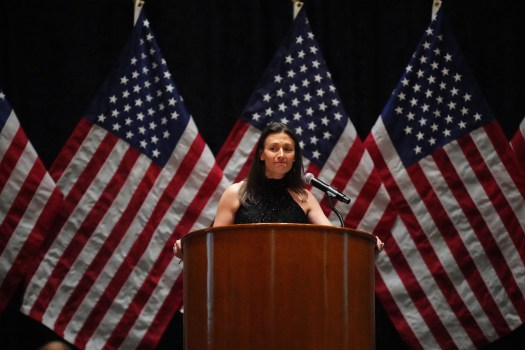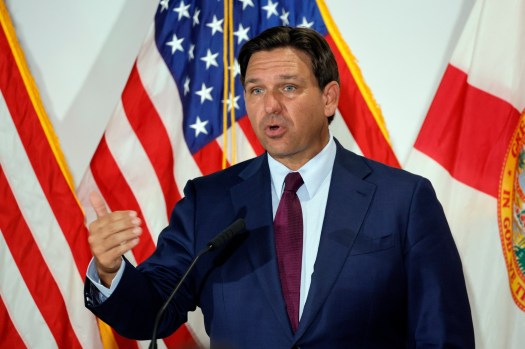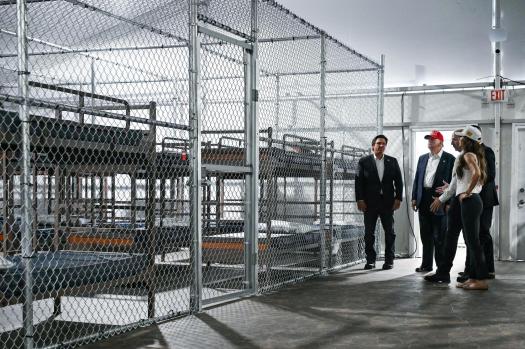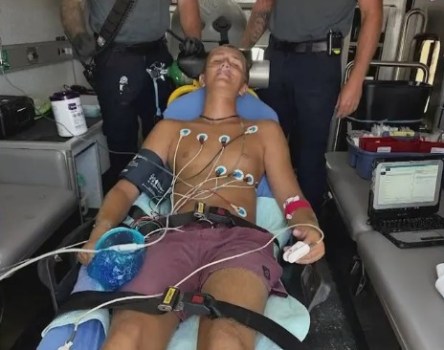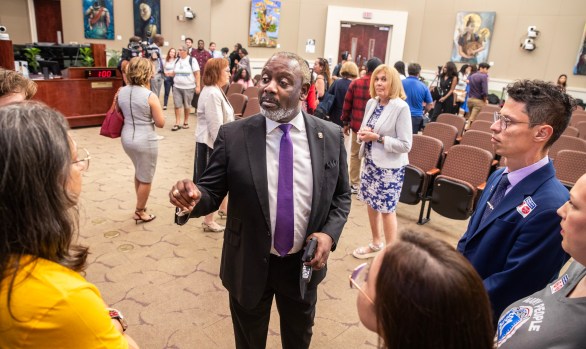Could the future of Florida Democrats finally be brightening?
They are fielding candidates with prior experience in high-profile elections for the U.S. Senate and governor positions in 2026.
This year, they performed remarkably better in five special elections for the state legislature and Congress.
Additionally, President Donald Trump has infuriated and engaged party members and activists.
In a recent speech, state party chair Nikki Fried said, “We will elect Democrats up and down the ballot.” And once more, not only for the South but for the entire nation, we will be a ray of hope and brightness.
When party activists, elected officials, and political donors from all over the state gather at the Seminole Hard Rock Hotel & Casino in Hollywood on Saturday for the Florida Democratic Party’s annual Leadership Blue weekend of planning, networking, and fundraising, she will undoubtedly reiterate this message. They will also hear from U.S. Senator Cory Booker of New Jersey and Governor Andy Beshear of Kentucky, two potential contenders for the Democratic presidential nomination in 2028.
In a May 31 speech to the Broward County Democratic Party, Fried included a note of sobriety among messages of optimism regarding whether or not things are improving for Florida Democrats: “Now we’re not there yet.”
Florida Democrats face a number of interrelated difficulties. They are difficult to resolve, and potential fixes are costly and time-consuming.
According to Kevin Wagner, a political scientist at Florida Atlantic University, there is no simple way for the Democrats to win in a state that has been moving increasingly Republican.
In Florida, the number of active, registered voters is now far higher among Republicans than Democrats. Since 2002, Democrats have won six statewide elections while Republicans have won 32. Democrats haven’t won a gubernatorial election in over thirty years, and they haven’t won a major statewide contest since 2012.
Additionally, Republicans control an overwhelming majority in the Florida Senate, Florida House of Representatives, and the state’s congressional delegation.
In other words, it won’t alter in a year. U.S. Representative Jared Moskowitz stated, “We didn’t get here in a year, and it’s not going to change in a year.”
Moskowitz, a centrist Democrat who has served in the state legislature and on the Parkland City Commission, represents a congressional district in Broward-Palm Beach that, like the rest of the state, has shifted toward the Republican Party in recent years.
The congressman’s assessment of his party’s main challenges is more straightforward than that of many prominent Democrats.
Because of what people are witnessing in Washington, there is a lot of energy at the moment. (20)26 will be a favorable year for Democrats in the past. “And through that energy, there will be fundraising that will help some of the numbers in Florida,” he said in a recent interview, adding that it will take years.
Does the passage of several years indicate the Democrats have a chance to win the U.S. Senate or the governorship next year?
Well, it’s not clear. It depends, after all. In the words of Joe Biden, “Don’t compare me to the Almighty.” Contrast me with the other option. Therefore, we must determine who is competing against whom, Moskowitz stated.
The impact of Trump’s tariffs and proposed cuts to the Medicaid health program, as well as what else transpired in Washington, he continued, make it impossible to predict where the economy will be in the coming year.
Therefore, it is far too early. However, I am realistic as well, and I know the statistics showing that there are 1.2 million more Republicans than Democrats in Florida. In an interview prior to the state Division of Elections’ most recent report on June 10, Moskowitz stated that the Republican lead was growing by 1.3 million voters.
Democratic National Committee chair Ken Martin added that it will take time for his party to regain its competitiveness in Florida.
It took time for Florida to transition from a blue to a red state. It required time. He stated in an interview during a recent trip to Florida that it would take time for us to change it from red to blue. We will need to devote time, energy, and money if we want to change a red state into a purple state and then a blue one.
“Effort cannot wait,” Martin stated.
We must get started right away and make the most of our time. As a Democratic Party, we cannot continue to wait until election year to launch our campaign. According to Martin, we must begin organizing and constructing the infrastructure immediately, even if doing so will require additional funding.
Democrats in Florida and elsewhere, according to Martin, should seek opportunities in lower-level positions rather than the large, well-known ones that garner a lot of attention.
What is the current course of action? Regain your victory in mayoral elections, county board elections, and school board elections. He advised beginning grassroots development in order to position oneself to begin regaining some of these counties.
Fried and Weston U.S. Rep. Debbie Wasserman Schultz, the senior Democrat in the Florida congressional delegation and a former DNC chair, also stressed the need of focusing on downballot elections as the party looks to regain its competitiveness in the state.
Florida, which used to be the nation’s most swing state and could go either way in a presidential election, has quickly turned into a Republican hot spot.
Immediately after President Barack Obama won Florida in 2012 on his way to a second term and then-U.S. Sen. Bill Nelson won reelection the Democrats last major statewide wins the party had had 558,272 more registered voters than the Republicans.
The Democrats were still ahead in November 2020.
Then, Governor Ron DeSantis changed his approach to the coronavirus outbreak. Prior to many other states lifting the regulations, he initially complied with many of the recommendations made by public health professionals. Compared to those who moved to Florida in the latter half of the 20th century, newcomers drawn by what the governor vigorously promoted as the free state of Florida were significantly more Republican.
By October 2021, Republicans outnumbered Democrats in the state’s registration. Republicans now lead by 1.3 million votes.
By 2024, Florida had become so firmly Republican that neither Trump nor the Democratic candidate, Kamala Harris, who was then the vice president, invested much time or money in running in the state.
Trump defeated Harris by 13.1 percentage points.
Trump defeated Joe Biden by 3.3 percentage points in 2020. Trump was only 1.2 percentage points ahead of Hillary Clinton in Florida in 2016, making the race even more close.
As Florida looks increasingly out of reach for Democrats, it s become harder for the Democratic Party to convince donors to provide the kind of money needed to do the work that could pay long-term dividends, such as field organizing efforts and consistent campaigns to register voters.
Republicans, who control all the levers of state government, are far more successful at attracting financial support, helping them fuel voter outreach, including registration.
Moskowitz was direct: We can’t win if we don’t concentrate on registration. (The) math doesn t work if we don t focus on registration. But, he added, that s going to take money.
Fried recently announced that Florida would soon become the fourth state with a year-round statewide organization.
In April, the national partyannouncedits organize everywhere, win anywhere strategy to provide $1 million a month for turbocharging investments in on-the-ground organizing and party building.
Florida, like other red states, will get $22,500 a month. The allocation, for a state the size of Florida, seems paltry, but Martin said in an interview the amount is a baseline and the national party would be doing more on top of that to help our candidates and the (state) party for sure.
The ability of the national party to ramp up spending on organizing is uncertain. The New York TimesreportedWednesday that the DNC is suffering significant financial strains with a drop in big donations.
Evan Power, chair of the Florida Republican Party, scoffed at the Democratic Party s organizational abilities. On the Florida Democrats website if you click on state leadership, it comes up as page not found. That explains the Florida Dems in a nutshell. They have become a party that has sold out to their radical leftist fringe and as a result have no base or future in Florida, Power said via text.
So far in June, high profile candidates announced they re running in next year s marquee contests:David Jollyfor governor andJosh Weilfor U.S. Senate.
Both have national followings that could help them raise the enormous sums each has said $100 million needed to mount serious, statewide campaigns in Florida. Weil said he d devote $10 million of that toward voter registration efforts.
Jolly is a former Republican member of Congress who left his party during Trump s first term. He s well known by many in the Democratic base for his years as a commentator on MSNBC, party members favored cable-news source.
Weil was the unsuccessful progressive candidate in an April special election in Florida s Sixth Congressional District. Though he lost, he built up a national fundraising base that allowed him to raise vastly more money than Republican Randy Fine. Weil said he can tap and grow that donor base to raise money for 2026.
In 2022, DeSantis and his allied political committee spent $100 million on his reelection. With donors largely writing off Florida that year, Democratic gubernatorial candidate Charlie Crist spent about $31 million.
Money doesn t guarantee victory. Also in 2022, then-U.S. Sen. Marco Rubio, R-Fla., raised and spent $50 million and went on to easily defeat his challenger, then-U.S. Rep. Val Demings, D-Orlando who spent far more: $79.9 million.
Also joining the candidate field in June, was Jose Javier Rodriguez, a former state senator from Miami-Dade County who is popular with many in the party. He s running for state attorney general.
Democrats are touting the results in Florida special elections in 2025 two for Congress, one for the state Senate and two for the state House as evidence they have growing support, though the Republicans won all five, including the Fine-Weil contest.
In each case, the Democratic candidate in the special election did better than the Democratic candidate in the November 2024 election, and the Republican candidates did worse than the 2024 candidates.
Wasserman Schultz told party activists that the improved showings for her party in the April 1 special congressional elections sent chills up MAGA s spine.
She said the Democratic congressional nominee edging out the Republican in Escambia County, anchored by Pensacola in the far western part of the Panhandle was a big f deal.
Wagner, the FAU political scientist, cautioned against reading too much into comparisons of special elections to last year s general election.
Special elections can be very idiosyncratic, which means that they re often highly dependent on local circumstances, he said. And turnout tends to be very different than what would occur in a national election.
Wagner agreed with Moskowitz that the election after a president is elected is usually good for the party that doesn t control the White House. The Democratic Party should perform better during the midterm.
The harder question to answer is how much better? Are they going to do better enough to flip seats and to change the makeup of the Legislature either at the state level or the national level? Wagner said. The problem is the Democratic Party is so far behind in the state of Florida. They need to do more than better. They need to reverse a long term trend.
Political writer Anthony Man can be reached at [email protected] and can be found @browardpolitics on Bluesky, Threads, Facebook and Mastodon.
